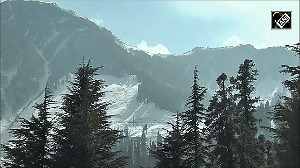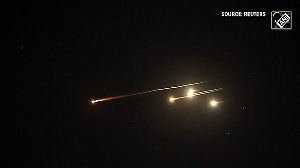When President Pervez Musharraf moved to contain the judicial crisis in Pakistan, the mainstream media were among the first casualties but no threat was directed at the radical jihadi press, which has been just as critical of his decision to suspend Chief Justice Iftikhar Mohammed Chaudhry, a prominent US daily said on Thursday.
Critics, reported the Christian Science Monitor, say the discrepancy underscores how Musharraf's nurturing of Pakistan's private press has spawned a virulently anti-Western and anti-government jihadi media.
And while this extremist-linked press spins on relatively unmolested, the country's secular television stations and newspapers face consistent harassment by the government, the paper said quoting human rights groups.
"Under increasing political pressure at home and abroad, the Musharraf government is resorting to heavy-handed tactics in dealing with critics and the independent media," a recent statement from the New York-based Committee to Protect Journalists said.
The proliferation of jihadi media, said the paper, puts the President in a difficult position: either crack down on them and risk further alienating a dangerous segment of the population, or let them undermine his leadership with conspiracy theories and calls to arms that bolster terrorism.
Pakistan's jihadi press, about two decades old, has largely escaped heavy-handedness, even though it glorifies the bloody exploits of outlawed militants and expresses violent opposition to the government's policies, said the Christian Science Monitor.
Few have seriously studied this universe of anger and alienation, but those who have say it frightens them. Since 9/11, they say they've watched the collective audience of jihadi media grow four times in size, the report said.
Radical newspapers now compete with the leading English dailies in circulation, and the jihadi media arsenal includes pirated radio stations, DVDs, and Internet sites, it said.
"These publications should not be taken lightly," Mohammed Shehzad, editor of the Pakistan Media Monitor, a subscription-based service that translates the radical press into English, is quoted as saying.
Last year, he and others point out, feuding religious leaders in the tribal belt stoked a violent war between their followers through illegal radio stations. Twenty-five tribesmen died and 15 were wounded.
Even more disturbing, the paper quoted observers as saying, is that the government cannot -- or will not -- clamp down on the radical media. "The government is not sincere in stopping them," says Shehzad.
Referring to ransacking of the office of GEO television by police, the paper pointed out that a radio programme of extremist group Jamaat-ud-Dawa continued to blast the government for sacking of Chaudhry.
"The government cannot be blamed for any such thing," the paper quoted Information Minister Muhammed Ali Durrani as saying. Police across the country have been tasked with confiscating hate material, he said.
"We don't want to suppress media, but, at the same time, we don't want to see the extremists' viewpoint."
The best way to neutralise radical media, critics say, is to create more independent media that can criticise the radical press and shrink the public's appetite for it.






